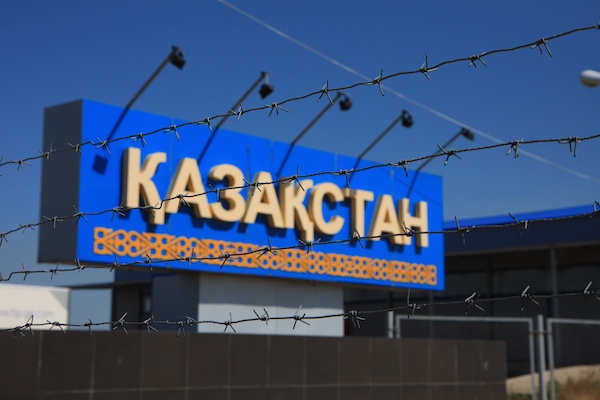
Kazakhstan Among the 50 Best Countries For Doing Business, But Cross-Border Trade Barriers Remain
Publication: Eurasia Daily Monitor Volume: 8 Issue: 206
By:

Kazakhstan has been ranked among the top 50 world economies in the Doing Business 2012 report, compiled by the World Bank and its private-sector lender the International Finance Corp (i-news.kz, October 20). The ranking places Kazakhstan 47th among 183 countries in a study assessing business regulations in ten areas such as starting a business, protecting investors, resolving insolvency, and trading across borders. The Kazakh authorities have paid particular attention to this rating. In his 2010 address to the nation, President Nazarbayev called on the government to create conditions for Kazakhstan to enter the ranks of the 50 best business climate economies by 2015 (kursiv.kz, October 27). Although the goal was achieved four years earlier and the Central Asian country has obtained leading positions in some categories, its scores in cross-border trade remain extremely low, similar to the rest of the CIS countries.
Kazakhstan’s business climate has improved dramatically in two consecutive years, climbing 11 places this year and 15 places in 2010. The 2011 World Bank Doing Business Report ranked Kazakhstan as the world’s fastest reformer owing to the government’s introduction of the greatest number of pro-business changes during the past year. The 2012 ranking makes Kazakhstan the seventh best country for business among all Eastern European and former Soviet states, even ahead of some EU members such as Poland, Hungary, and the Czech Republic. In contrast, Russia remains considerably behind its partners in the Customs Union, holding 120th position, much lower than Belarus (69) and Kyrgyzstan (70). Georgia has one of the leading positions in the world raking 16th in the Doing Business 2012 report (https://www.doingbusiness.org; IA Novosti Kazakhstan, October 20; Megapolis.kz, October 24).
The most notable reforms in Kazakhstan took place in protecting investors and paying taxes. The country moved up 34 places in the category of protecting investors, reaching tenth in the world. Reforms included regulating the approval of transactions between interested parties and making it easier to sue directors in cases of prejudicial transactions. The previous year, Kazakhstan introduced requirements for greater corporate disclosure in company annual reports.
Simplifying the tax payment system and lowering taxes to encourage small and medium business growth moved the country up 13 positions to number 13th in the world. According to the report, firms make seven tax payments a year, spend 188 hours a year filing, preparing and paying taxes, and pay total taxes amounting to 15.9 percent of their profits.
The Doing Business 2012 report shows that Kazakhstan maintained its advanced positions for registering property (29) and enforcing contracts (27), but its scores remained startlingly low for dealing with construction permits (147) and trading across borders (176). The costs associated with exporting and importing in Kazakhstan are three times higher than those in high-income economies such as the United States and Western and Central Europe, which have the world’s friendliest business environment. The time needed to process exports and imports is twice as long as in high-income economies. Customs clearance and technical inspections take more than two weeks, and twice the number of documents is needed for cross-border trade in comparison to developed economies.
With the exception of Georgia, cumbersome trading regulations have persisted in the post-Soviet space, placing Ukraine, Russia, Kyrgyzstan, and Uzbekistan in the last 23 positions for cross-border trade. Trade barriers present a serious problem for the integration of the region into the global market economy and threaten the success of regional development initiatives such as the restoration of the Silk Road trade routes. The establishment of the Customs Union and the pending introduction of a Single Economic Space between Russia, Kazakhstan, and Belarus may alleviate some trade problems through the harmonization of trade tariffs. However, trade barriers outside the borders of the Customs Union will likely remain.
The oil-rich Central Asian country with $136 billion of direct foreign investment has worked consistently on improving its business regulations to protect investors and encourage small and medium enterprise development. Kazakhstan, which was hit hard by the financial crisis, managed to return to relatively high levels of GDP growth – from 1.2 percent in 2009 to seven percent in 2010 and an expected 6.5 percent GDP growth in 2011 (https://data.worldbank.org). The government’s diversification program has yielded growth in the manufacturing industry by almost one fifth in 2010, with overall industrial growth of ten percent according to official Kazakhs statistics. The foreign trade surplus grew by more than one third in the past year, to $11.6 billion in the first quarter of 2011, from $8.1 billion in the same period in 2010 (PRNewswire, October 21).
Although Kazakhstan has adopted a number of laws and programs to support business development, their implementation is not analyzed by the Doing Business ratings. Despite the low taxes, small and medium-sized businesses still have to pay bribes to local bureaucrats, which substantially reduces their profitability, commented the vice-president of the Independent Association of Entrepreneurs Timur Nazhanov (kursiv.kz, October 24). Kazakhstan ranks in the lowest 20 percent on the World Bank’s Control of Corruption index for 2010. The Voice of Accountability index is also in the same low range, while two governance indexes have been increasing in the last five years: the Government Effectiveness index reached 45 percent, and the Political Stability index stands at 62 percent (https://info.worldbank.org/governance/wgi/index.asp).




